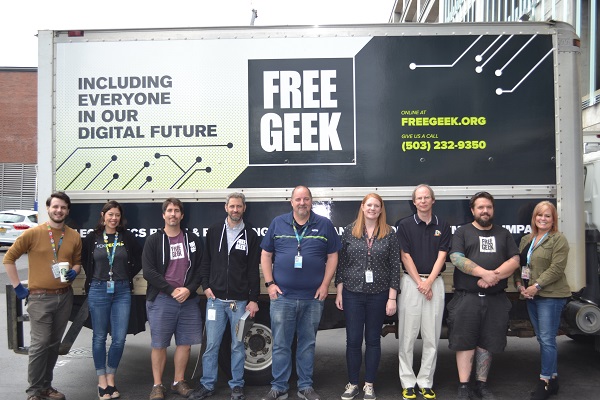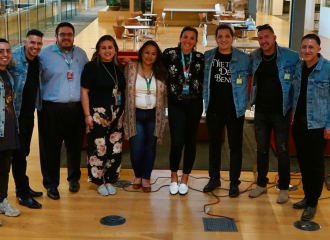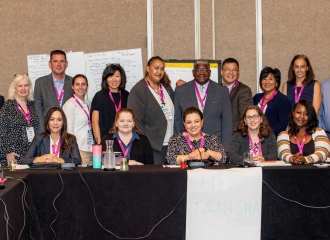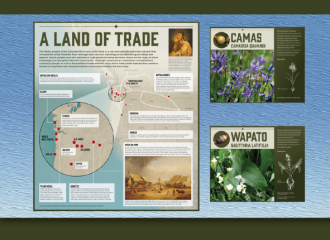Sometimes, the simplest question can lead to transformational change within an organization. That’s exactly what happened for a group of employees at the Port of Portland.
“Is this the only option?”
That was the question. Its answer led to one of our more significant partnerships with a local nonprofit.
The reason it was asked is a little more complicated.
Historically, our Information Technology (IT), Environmental and Administrative Services departments teamed up to collect old computers from a variety of sources: equipment no longer usable by our team, unclaimed items from the PDX Lost & Found, and unwanted items from airport tenants collected by the PDX Waste Minimization Team.
Our goal was to keep the technology away from the landfill, as their waste can be toxic to the environment.
“E-waste continues to be a challenge globally as outdated or unwanted equipment is discarded. Oregon has disposal bans and regulations in place to help reduce the environmental impact, but even the benefits of recycling are limited,” said Erin Anderson, an environmental specialist on our Waste Minimization Team.

While the goal was rather clear, the process to preserve this equipment wasn’t a simple one. After rounding everything up, our IT team had to wipe information from each computer and create an inventory of the equipment. Distribution staff would then load everything into an online auction system and work to connect the tech to their new owners. It was lots of work with little community benefit.
We went through all that trouble because we believed the State of Oregon prohibited public agencies from donating equipment when it had a resale or surplus value. But as the IT department sat down to develop its departmental equity plan, staff began to wonder: Is this truly the only option?
The team found an ideal alternative in Free Geek, a local nonprofit that focuses on building digital equity – addressing the economic, educational and social inequalities that divide those who have access to computers and the internet and those who don’t.

“There’s more technology in the world than is needed by the people who have it. And there are lots of people who don’t have access to technology. Free Geek tries to build a cycle that gets people the technology they need through re-use,“ said Hilary Shohoney, executive director of Free Geek, in a presentation to the Port of Portland Commission this August.
The need for an organization like Free Geek has only intensified because of the COVID-19 pandemic. With many students making a sudden shift to virtual learning, Shohoney shared that demand for used laptops has spiked by nearly 4,000%.
Free Geek felt like the ideal organization to engage, but was a partnership even possible?
“When we dug into this perceived barrier, we discovered it was not a barrier at all,” said Tony Bonnett, manager of IT client services at the Port. In reality, a Port contracting rule simply stated that donations must promote our business interests and result in a net cost that’s less than if we disposed of the equipment by other methods.
“Since equity is key to our business interests, the donation plan was in full alignment with the contracting rule,” Bonnett said.
Free Geek takes in more than 1 million pounds of e-waste each year and recycles and refurbishes this technology to connect individuals and community-change organizations with cell phones, computers and other necessary technology that meets their needs.
“Reducing and preventing waste has far more environmental benefits, and the partnership with Free Geek facilitates that through reuse, repair and salvage of electronics,” Anderson shared.

Now nearly one year into our partnership, the Port has donated 688 tablets, 488 smartphones, 211 desktop computers, 160 LCD computer monitors, 126 laptops, 102 servers and 47 LCD TVs. And if our team hadn’t taken the time to ask what barriers were stopping us from doing more to share our resources with the community, it could have been more of the same for these 1,8000 electronic items.
“From an equity standpoint, the main question that we urge people to ask themselves is, ‘Who benefits and who is burdened by our decisions?’ While this is a simple question, it requires taking the time to unpack the question, to collect data and to challenge our assumption and the entrenched culture that develops around our decision-making processes,” explained Dr. Steven Nakana, social equity program manager at the Port.
With demand high as many students continue to learn remotely, we know the 450 Port laptops on their way to Free Geek this month will be used almost immediately.
“This collaboration with Free Geek is a perfect example of a three-legged stool – we are all working together to provide support for a greater purpose,” Bonnett reflected.
Our diversity, equity and inclusion work: The Port of Portland focuses on addressing historical inequities and leveraging our resources to make the region we love even better. We began formal implementation of an equity plan in July 2019, which includes goals to increase small business participation; create an equitable, inclusive and welcoming place to work; and engage the community. Read a progress update on this work.





